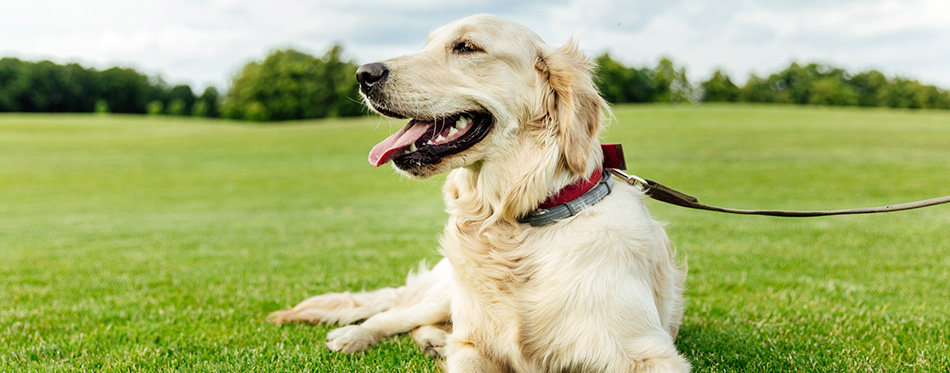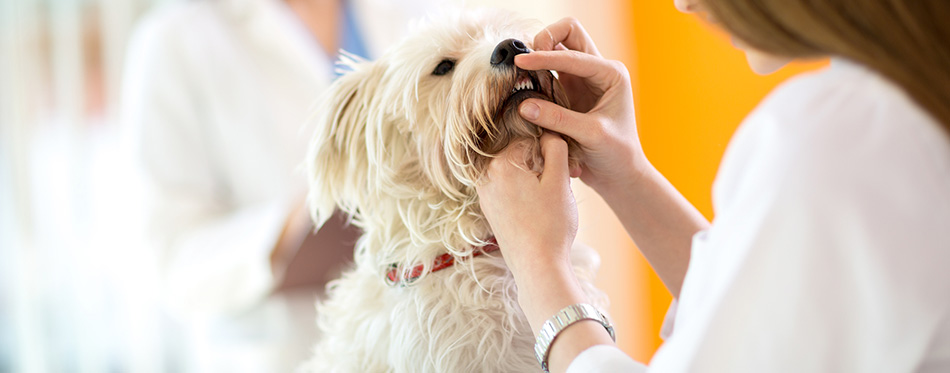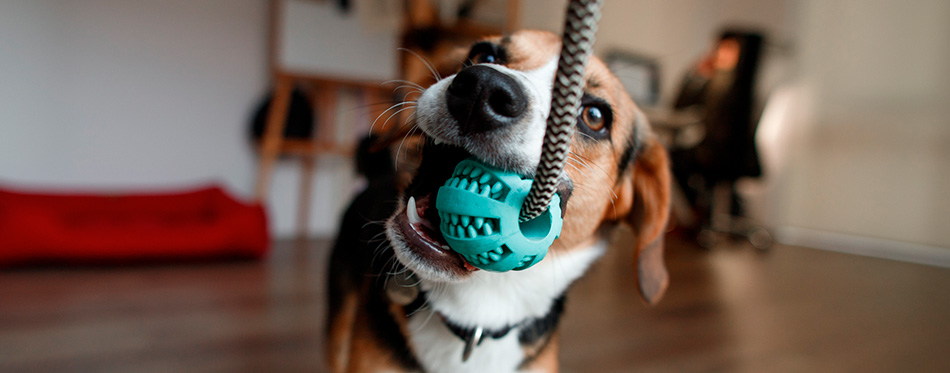If your dog’s halitosis is taking your breath away, then it is time to get things sorted. Stinky breath in canines is not normal and could be a sign of an unhealthy mouth, tum or something more serious.
If any underlying medical causes for canine bad breath have been ruled out and your pooch’s whiffy mouth is down to poor oral hygiene, then there are lots of things you can do to make life with your pet sweet again. We take a look at the best home remedies for bad dog breath that will kiss your pooch’s foul mouth goodbye.

What Causes Doggy Bad Breath?
Bad breath in your pooch can be a sign of a not so healthy mouth or digestive system and should be managed and monitored. The medical term for stinky breath is halitosis and while it can be a symptom of more serious underlying health issues with the kidneys, liver or gastrointestinal tract, it is usually caused by poor oral hygiene.
Periodontal disease is the most common cause of whiffy breath in your dog as, just like humans, a build-up of plaque and tartar on their teeth can lead to the growth of bacteria responsible for the smell. And, to get straight to the point, some of your doggo’s less than sanitary habits such as rummaging through the trash can, eating their own poop or other deeply unpleasant things can also add to the foul odor coming from their mouth. This can all add up to a less than sweet smelling pooch you need to keep at arm’s length.
So, before we look at when you really do need to pop your pongy pooch to the vet, we explore eight simple home remedies for bad dog breath to get your pup back to the fresh.
Brush Their Teeth Regularly
Your pup will always have some smell to their breath, but you will know when the canine halitosis has gone completely off the scale. That smell is most likely coming from inside their mouth and if left untreated, can lead to real problems with their teeth and gums. The main cause will be plaque and bits of food debris stuck in their teeth and without a little oral intervention, will only get worse. The simplest way to fix bad dog breath in your dog is to have a regular tooth brushing routine. The size and breed of your dog will dictate how often you need to brush as for example, smaller pets with pushed up faces such as Shih Tzus are more at risk of decay so will need their teeth brushing every day. But at least several times a week for at least 30 seconds – or as long as your pup will let you – should be the minimum as that soft plaque can harden after two or three days. Use a soft bristled dog toothbrush or, if your pet is really not playing ball, a piece of gauze wrapped around your finger. If you’re struggling to remove all the plaque and tartar, book your pooch for a full dental clean with your veterinary professional.
Give Your Dog Some Chew Treats
When looking at how to get rid of bad dog breath, a chew can is not only a special treat to keep your furry friend occupied, it can also act as a super-cleaner when it comes to whisking away plaque, food and mouth grime. There are some excellent dental chews that are specifically formulated to help with your dog’s oral hygiene as well as tasting great and they come in a range of sizes to suit the breed and age of your pet. Or look to give them a natural chew such as a rawhide bone which will not only capture their attention but keep them occupied for hours! (Just make sure they are supervised and remove the rawhide chew when it gets too small to avoid the risk of choking).
The simple act of repeatedly chewing will get their natural salivary juices flowing as well as gently scour and clean away food debris and surface plaque from their teeth, leading to a healthier mouth and fresher breath. However, make sure you monitor how many chews your pooch gets and don’t overfeed them, especially if your dog obese or prone to putting on weight.
For a wider selection of choices, check out our Dog Chews and Rawhide For Dogs guides.
Crunchy Vegetables
Most pooches love to chew and for fresh, healthy breath, a crunchy carrot or a cored apple can both be an awesome tooth-friendly snack for your pet. Not only are they delicious, but the action of chewing something so crunchy will help to sweep away grime and debris. But it doesn’t stop there, especially with carrots as they contain beta carotene which also helps to stimulate the salivary glands, keeping your dog’s mouth moist and clean.

Look at Their Diet
What your dog eats could well be having a direct effect on how sweet – or not – their breath is. Dry kibble-style dog food is less likely to make his mouth stinky than wet food so if your pet has bad halitosis, it may be time to change his diet to the dry side. If your pet is reluctant or there are reasons why he needs dry dog food, then look at mixing a balance of dry and wet dog food and see how they go. Always ensure your pooch is getting a nutritionally balanced diet and speak to your vet if you feel you need something more tailored to his breath issues as there are dental-health formulated diets you could also try.
Add Some Probiotics
If you suspect your hound’s tum could be causing his bad dog breath, then as well as looking at their diet, consider probiotics to help get his gut’s friendly bacteria back on track. Just like humans, your pup needs bacteria to help break down food in their digestive tract and if the balance between the good and bad bacteria is off, them their digestive system and breath can suffer. As an effective stinky dog breath home remedy, you could buy probiotics that are specifically formulated to your pup and add to their mealtimes or you could look at using yoghurt. Mix a natural probiotic yoghurt with a little brown rice and add to their dinner for a super digestion boost. Yoghurt can also help to reduce hydrogen sulphide, which contributes to their whiffy breath as well as help to rebalance the natural bacteria in their tum and mouth. For more options, check out our detailed review of probiotics for dogs.
Watch Their Water
Your dog’s hydration levels and how clean their drinking water is can also play an important role in keeping that bad dog breath at bay. If your dog is drinking enough water then he is less likely to suffer from a dry, dehydrated mouth, which can start to smell if left unchecked.
Bacteria can also build up in a dirty drinking bowl and contaminate your pooch’s drinking water, adding to the stinky breath factor. Regularly changing your dog’s drinking water and cleaning their water bowl can really help his oral hygiene and you can also look at adding a ‘healthy mouth’ formula, containing enzymes and chlorophyll to their water. Or for one of the best natural remedies for bad dog breath, a few squeezes of fresh lemon juice in his water can help to keep both his water and breath clean and fresh. Take a look at our review of dog water fountains for more options.
Natural Remedies
Open up your kitchen cupboard and chances are you have a host of natural remedies for bad dog breath. Here are the best ones:
- Coconut oil
Used in small amounts to clean their teeth or added to their meal, coconut oil can help to reduce harmful bacteria in the mouth as well as plaque build-up. Oh, and it can boost their digestive health too.
- Herbs
Both fresh parsley and dill have antibacterial properties which make them nature’s breath-fresheners. Simply chop the herbs up finely and sprinkle over their food. The chlorophyll in parsley will also help to neutralize those whiffy odors.
- Cinnamon
This dog-friendly spice contains an essential oil which can kill the nasty bacteria in your canine’s mouth, helping to keep it sparkling fresh. Sprinkle small amounts on their food at mealtime.
Add Some Toothpaste to Their Chew Toy
And finally, get minty with your pup by smearing a little dog toothpaste on their favorite rubber chew toy. Adding a little toothpaste to their favorite chew toy is a double whammy when it comes to seeing off their halitosis as the chewing action sweeps debris from their teeth, while the toothpaste leaves their mouth and breath minty fresh. Or consider buying a canine mouthwash or spray that contains the pet-safe antibacterial agent, chlorhexidine. Head over to our review of the best dog dental spray for more choices.

When to See Your Vet
Most of the time, it will be obvious that poor dental hygiene is the cause of your pooch’s stinky breath and if so, you can use our home remedies to get their halitosis back under control. However, it’s always a good idea to get a dental check as part of your pooch’s planned vet visits. But if your efforts to sweeten your dog’s breath are still not working or you suspect any of the following, then get your pup down to the veterinary surgery pronto:
- Difficulty eating
Not only does your pooch have less than sweet breath, but if he seems to be off his food or finds eating his dinner a problem and is perhaps drooling more than usual, this could be a sign of advanced tooth decay which needs veterinary intervention.
- A fruity smell to their breath
If their mouth smells sweet than foul, this could be a symptom of diabetes, particularly if you have noticed they are drinking and going to the loo more frequently.
- A urine odor
If there is a pee-like smell to your dog’s bad breath, this could indicate that all is not well with their kidneys so get him to the vet for a full check-up.
- Bad breath and vomiting
If your dog’s breath is not only foul, but they are off their food and are also being sick, then something could be up with their liver, especially if their gums have a yellow tinge. An urgent check-up is vital to rule anything nasty out.
Sources:
- 7 Reasons Your Dog Has Bad Breath – PetMD
- Bad Dog Breath — 8 Home Remedies – Dogster
- How to Get Rid of Stinky Dog Breath – American Kennel Club

